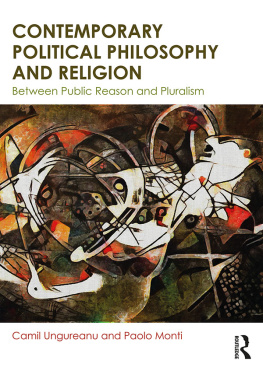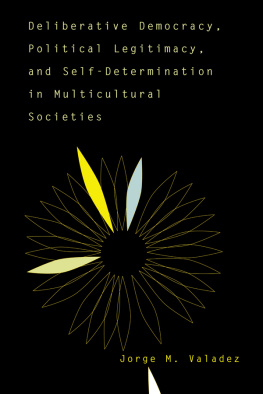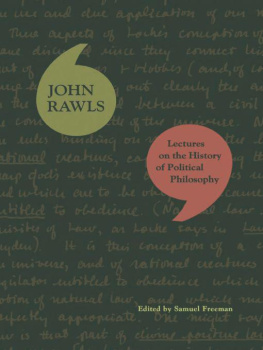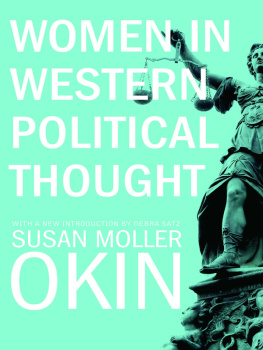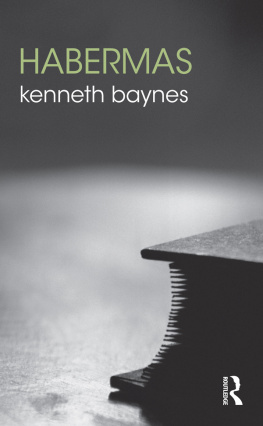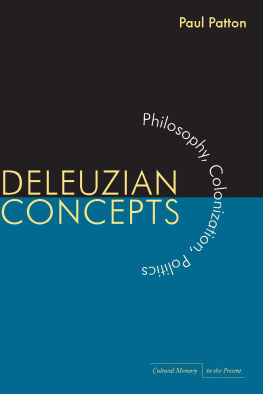Table of Contents
Pages
CONTEMPORARY POLITICAL PHILOSOPHY AND RELIGION
What is the place of religion in a pluralist democracy? The continuous presence of religion in the public sphere has raised anew normative and practical issues related to the role of religion in a democratic polity, generating spirited political debates in Western and non-Western contexts. Contemporary Political Philosophy and Religion provides an advanced introduction to, and a critical appraisal of, the major schools of political thought with a focus on the relationship between democracy and religion. Key features of this book include:
Analyses of different political traditions: liberalism, republicanism, deliberative democracy, feminism, postmodernism, multiculturalism, and interculturalism;
Critical discussions of key contemporary philosophers, such as John Rawls, Jrgen Habermas, Richard Rorty, Charles Taylor, Susan Moller Okin, Martha Nussbaum, Will Kymlicka, Chandran Kukathas, and Bhiku Parekh;
A pluralist approach that questions the strict divide between analytical and continental political philosophy;
Discussion on the place of religion in politics from multiple perspectives by drawing on a plurality of political contexts, both Western and non-Western;
Analyses of legal and political cases related to different religious traditions, for example, Islam, Confucianism, Buddhism, Christianity, and Hinduism.
This comprehensive text will be of great use to students of religion and politics in the fields of political and legal theory, and religious and theological studies, while also offering critical insights and arguments that will be of interest to the experts in the field.
Camil Ungureanu is Associate Professor of Political Philosophy and Coordinator of the MA in Political Philosophy at the Universitat Pompeu Fabra, Spain. He has published articles in several journals and co-edited various books on the topics of contemporary political philosophy, art, religion, and politics.
Paolo Monti is Lecturer at Universit Cattolica del Sacro Cuore in Milan, Italy. He has published and edited several works on the philosophy of social practices, the ethics of democratic citizenship, and the role of religion in the public sphere.
Camil Ungureanu and Paolo Monti have written an impressive book full of insights on one of the most important political issues of our time. The book provides a compass with which to navigate the oceanic literature on the topic: the authors take the reader through very high seas of contemporary controversies on the place of religion in our societies. Ungureanu and Monti steer the boat to the safe harbour of detailed knowledge and dispassionate analysis despite the sheer complexity of the problem.
Lorenzo Zucca, Kings College London, UK
This book makes an important contribution to the ongoing debates about the role of religion in our contemporary democratic societies. It will be essential reading for scholars and students looking for a critical introduction to the debates, while Camil Ungureanu and Paolo Monti also provide their own original take on the subject.
Lasse Thomassen, Queen Mary University of London, UK
Complete, well-documented, lucid, and always thought-provoking, Contemporary Political Philosophy and Religion takes stock of a rapidly growing debate on the changing relation of religion and politics in the 21st century. Always paying the complexity of the subject its dues, Ungureanus and Montis volume is a must-read for any reader up to find her own way through the maze of the conflicting views on religion in the public realm.
Alessandro Ferrara, University of Rome Tor Vergata, Italy
CONTEMPORARY POLITICAL PHILOSOPHY AND RELIGION
Between Public Reason and Pluralism
Camil Ungureanu and Paolo Monti

First published 2018
by Routledge
2 Park Square, Milton Park, Abingdon, Oxon OX14 4RN
and by Routledge
711 Third Avenue, New York, NY 10017
Routledge is an imprint of the Taylor & Francis Group, an informa business
2018 Camil Ungureanu and Paolo Monti
The right of Camil Ungureanu and Paolo Monti to be identified as authors of this work has been asserted by them in accordance with sections 77 and 78 of the Copyright, Designs and Patents Act 1988.
All rights reserved. No part of this book may be reprinted or reproduced or utilised in any form or by any electronic, mechanical, or other means, now known or hereafter invented, including photocopying and recording, or in any information storage or retrieval system, without permission in writing from the publishers.
Trademark notice: Product or corporate names may be trademarks or registered trademarks, and are used only for identification and explanation without intent to infringe.
British Library Cataloguing in Publication Data
A catalogue record for this book is available from the British Library
Library of Congress Cataloging in Publication Data
Names: Ungureanu, Camil, author.
Title: Contemporary political philosophy and religion: between public reason and pluralism / Camil Ungureanu and Paolo Monti.
Description: New York: Routledge, 2018. | Includes bibliographical references and index.
Identifiers: LCCN 2017032582 | ISBN 9780415552189 (hardback) | ISBN 9780415552196 (pbk.) | ISBN 9781315142418 (ebook)
Subjects: LCSH: Religion and politics. | Political sciencePhilosophy. | DemocracyReligious aspects.
Classification: LCC BL65.P7 U54 2018 | DDC 322/.1dc23
LC record available at https://lccn.loc.gov/2017032582
ISBN: 978-0-415-55218-9 (hbk)
ISBN: 978-0-415-55219-6 (pbk)
ISBN: 978-1-315-14241-8 (ebk)
Typeset in Bembo
by Wearset Ltd, Boldon, Tyne and Wear
To Alexandra
To the memory of my mother (C.U.)
To my parents, for hope (P.M.)
CONTENTS
ACKNOWLEDGEMENTS
We thank Will Kymlicka for his promptness in making useful observations on an early version of the manuscript. Marcos Picchio was extremely helpful in proofreading, raising useful questions, and making suggestions concerning an earlier version of the manuscript. Friends and colleagues read versions of some of the chapters making useful comments: Joan Vergs and David Thunder (). We thank two anonymous reviewers for reading an earlier version of the first three chapters, and making useful suggestions. We would also like to thank Maria Whelan for her copy-editing of the manuscript. This manuscript was finished in May 2017.
INTRODUCTION
A plea for complexity
1 A plural landscape
Religion is a universal phenomenon in human evolution: it characterizes all historically known societies (Bellah 2011; De Waal 2013: 437).
Today secularism is a deeply contested concept and, as we will see throughout the book, it is used in quite different ways and contexts. In an initial approximation, it is helpful to reckon with three dimensions of secularism that do not necessarily go together: first, secularism refers to political arrangements between the state and religion based on modern constitutional principles such as equal respect, freedom of conscience, separation, impartiality, and neutrality. These arrangements and principles have been variously articulated in Western and non-Western contexts, leading to the formation of

